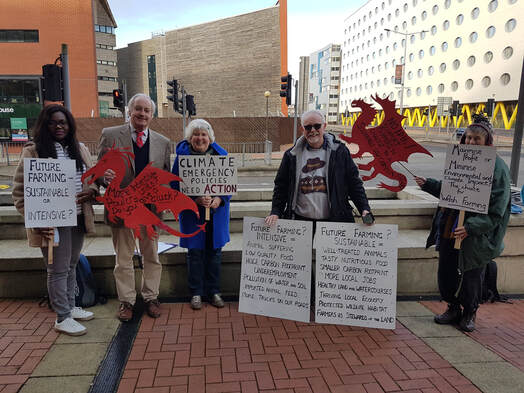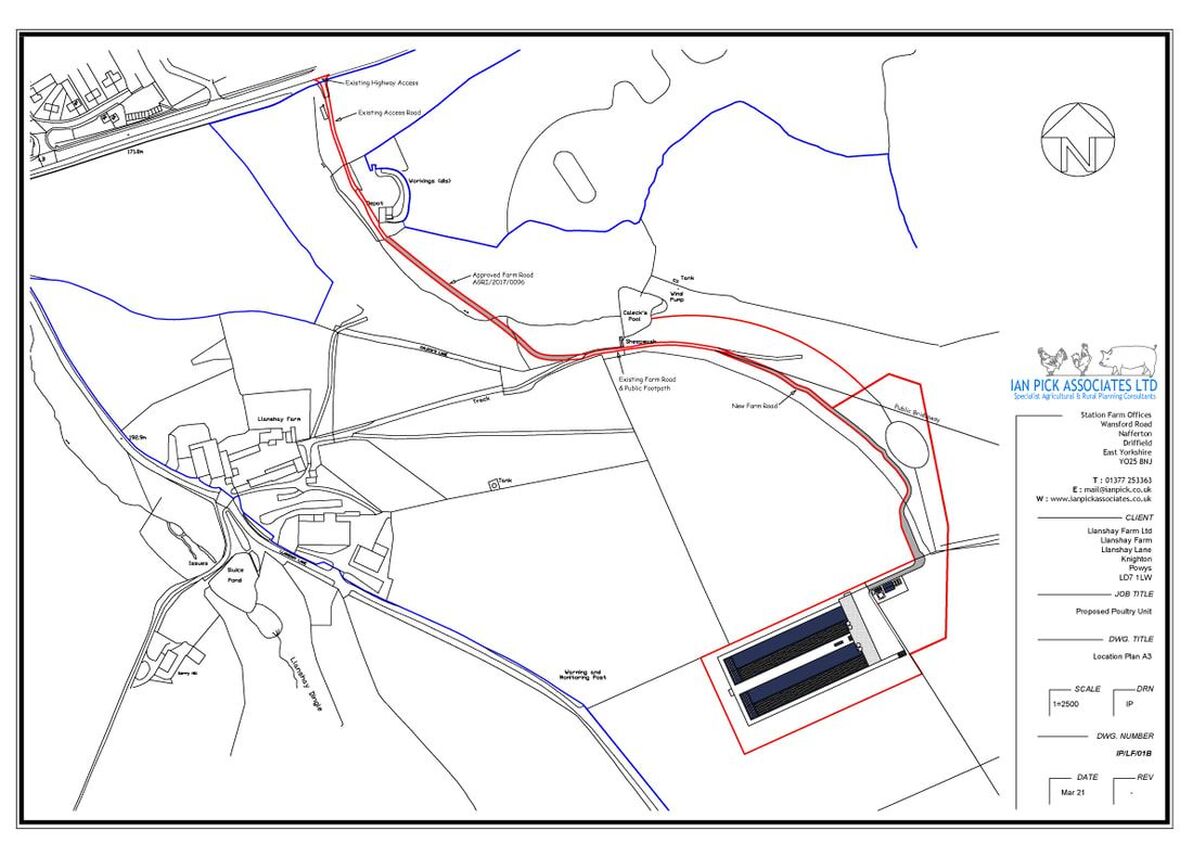
Sustainable Food Knighton’s battle against the spread across Powys of intensive poultry units (IPUs) was focused initially on the 2019 planning application for a 110,000 broiler chicken unit at Llanshay Farm very close to Knighton. The plan received approval in September 2020 but SFK applied for a judicial review of the Council’s decision in early November 2020 and the Council conceded after a High Court Judge granted permission to proceed to a full judicial review hearing. We received a massive boost in January 2020, after Powys County Council, faced with a Judicial review, conceded that it had acted unlawfully in granting planning permission.
Powys County Council admitted that the application should not have been approved, because there was no evidence before the Planning Officer to support the conclusion that the impacts on amenity would be acceptable because the fields would be “unlikely to be spread more than twice per annum”. In other words, it could not be assumed that the spreading of manure in order to dispose of it would not impact adversely on the local population or on people using the local area for recreation.
The official Consent Order confirming this outcome was issued on March 1st, agreement was reached on costs and the permission for the IPU development was quashed. Articles in the national press spread the good news and from the messages SFK received it was clear that groups and individuals opposing the development of similar intensive units took heart from our success.
Of course, we knew that the battle was unlikely to be over so quickly and that proved to be the case. PCC announced at the end of March 2021 that the application had been resubmitted with adjustments to the plan to address the particular points that led to the original planning approval being overturned. In November 2021 the application came before the full PCC planning committee. Two members of SFK made strong presentations but a councillor from Knighton Town Council made a presentation in support of the proposed IPU. The committee approved the plan by 15 votes to one. The result was obviously very disappointing for SFK but the campaign against unsustainable intensive poultry farming will carry on with the group focusing its efforts on changing Welsh government policy.
The issue of democracy and transparency in decision making
As many of you are aware the original planning application was decided under delegated powers by the Planning Officer. A request by our local County Councillor to call in the substantially amended re-application has been refused on the grounds that it should have been “called in” 21 days after the original application for it to be assessed by the full planning committee, unless substantially different information is brought to bear. We dispute this but as a result of the refusal the resubmission can only be put before full Planning Committee if the Head of Planning makes that decision. SFK takes the view that objections to the planning application would be far more likely to receive proper consideration in a democratic and transparent manner if put before the full planning committee.
A few words of thanks
We want to give our heartfelt thanks to all those who helped us with our campaign against the Llanshay IPU, particularly the Environmental Law Foundation and our brilliant legal team - Philippa Jackson and Ruth Keating at 39 Essex Chambers, and Matthew McFeeley at Richard Buxton solicitors. Thanks also to our planning advisor, Helen Hamilton, of Marches Planning, who has been involved in this campaign from the very beginning, and to the Brecon and Radnor Branch of The Campaign for the Protection of Rural Wales (CPRW) and all other organisations and individuals who worked so hard on investigations into the environmental impacts for the original planning application. Finally, a big thanks to all those many supporters who encouraged us and backed us financially both locally and nationally, through a crowd funding appeal as well as individual donations.
Camilla sums up
Sustainable Food Knighton spokesperson Camilla Saunders noted that farmers all over Wales and the UK are struggling to survive and some have given up, as weather becomes more uncertain, disease is rife among animals, and supermarkets insist on ‘cheap food’ for consumers. Of course, it is not cheap, when you look at the environmental costs, and how many farmers are going bankrupt, unable to meet the supermarkets’ conditions. Meanwhile huge corporations such as Cargill rake in profits from intensive chicken and pig rearing as they sell the infrastructure and feed to individual farmers and make sure to do well out of it.
Ms Saunders states, “The contributions of intensive farming to ecosystem damage, biodiversity loss and climate change have been well documented. This year, pandemics permitting, the COP15 on Biodiversity will take place in China in May and COP 26, the UN climate change conference will take place in Glasgow in November. Intensive agriculture will be high on the agenda as it is now a leading contributor to greenhouse gas emissions and plummeting biodiversity all over the world.
Powys and the Welsh government could take a lead in this, and not wait to be forced into doing the right thing by international law. Minister for the Environment, Leslie Griffiths, has agreed that farming must de-intensify, but so far nothing concrete has happened.
Refusing any further planning applications for IPUs and developing coherent agricultural policies that support farmers and their local communities would be a good start”.
Powys County Council admitted that the application should not have been approved, because there was no evidence before the Planning Officer to support the conclusion that the impacts on amenity would be acceptable because the fields would be “unlikely to be spread more than twice per annum”. In other words, it could not be assumed that the spreading of manure in order to dispose of it would not impact adversely on the local population or on people using the local area for recreation.
The official Consent Order confirming this outcome was issued on March 1st, agreement was reached on costs and the permission for the IPU development was quashed. Articles in the national press spread the good news and from the messages SFK received it was clear that groups and individuals opposing the development of similar intensive units took heart from our success.
Of course, we knew that the battle was unlikely to be over so quickly and that proved to be the case. PCC announced at the end of March 2021 that the application had been resubmitted with adjustments to the plan to address the particular points that led to the original planning approval being overturned. In November 2021 the application came before the full PCC planning committee. Two members of SFK made strong presentations but a councillor from Knighton Town Council made a presentation in support of the proposed IPU. The committee approved the plan by 15 votes to one. The result was obviously very disappointing for SFK but the campaign against unsustainable intensive poultry farming will carry on with the group focusing its efforts on changing Welsh government policy.
The issue of democracy and transparency in decision making
As many of you are aware the original planning application was decided under delegated powers by the Planning Officer. A request by our local County Councillor to call in the substantially amended re-application has been refused on the grounds that it should have been “called in” 21 days after the original application for it to be assessed by the full planning committee, unless substantially different information is brought to bear. We dispute this but as a result of the refusal the resubmission can only be put before full Planning Committee if the Head of Planning makes that decision. SFK takes the view that objections to the planning application would be far more likely to receive proper consideration in a democratic and transparent manner if put before the full planning committee.
A few words of thanks
We want to give our heartfelt thanks to all those who helped us with our campaign against the Llanshay IPU, particularly the Environmental Law Foundation and our brilliant legal team - Philippa Jackson and Ruth Keating at 39 Essex Chambers, and Matthew McFeeley at Richard Buxton solicitors. Thanks also to our planning advisor, Helen Hamilton, of Marches Planning, who has been involved in this campaign from the very beginning, and to the Brecon and Radnor Branch of The Campaign for the Protection of Rural Wales (CPRW) and all other organisations and individuals who worked so hard on investigations into the environmental impacts for the original planning application. Finally, a big thanks to all those many supporters who encouraged us and backed us financially both locally and nationally, through a crowd funding appeal as well as individual donations.
Camilla sums up
Sustainable Food Knighton spokesperson Camilla Saunders noted that farmers all over Wales and the UK are struggling to survive and some have given up, as weather becomes more uncertain, disease is rife among animals, and supermarkets insist on ‘cheap food’ for consumers. Of course, it is not cheap, when you look at the environmental costs, and how many farmers are going bankrupt, unable to meet the supermarkets’ conditions. Meanwhile huge corporations such as Cargill rake in profits from intensive chicken and pig rearing as they sell the infrastructure and feed to individual farmers and make sure to do well out of it.
Ms Saunders states, “The contributions of intensive farming to ecosystem damage, biodiversity loss and climate change have been well documented. This year, pandemics permitting, the COP15 on Biodiversity will take place in China in May and COP 26, the UN climate change conference will take place in Glasgow in November. Intensive agriculture will be high on the agenda as it is now a leading contributor to greenhouse gas emissions and plummeting biodiversity all over the world.
Powys and the Welsh government could take a lead in this, and not wait to be forced into doing the right thing by international law. Minister for the Environment, Leslie Griffiths, has agreed that farming must de-intensify, but so far nothing concrete has happened.
Refusing any further planning applications for IPUs and developing coherent agricultural policies that support farmers and their local communities would be a good start”.


